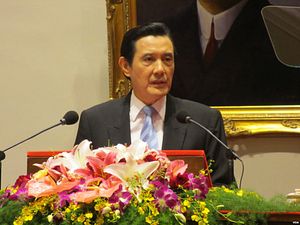On March 14, Ma Ying-Jeou, the former president of Taiwan, was indicted over secrets leaked by the Taipei District Prosecutors Office. If convicted, he might face a maximum of three years in prison. In a follow-up press conference, Ma maintained his innocence and demanded: “Where is the justice? I will definitely appear in court to fight for justice.”
Unfortunately, Ma’s demand for justice has sparked little compassion to date among the public; few ordinary Taiwanese stood up for him. According to a recent survey done by a local public opinion foundation, more than 45 percent of respondents thought the indictment was proper, while only 24 percent of respondents thought it improper. Even the Kuomintang (KMT), the party Ma formerly led as chairman, shows a split in endorsing Ma. In a rally for Ma on March 17, only 15 KMT legislators showed up to support their party’s former president.
The incident once again reveals Ma’s unpopularity in Taiwan. However, it seems that Ma himself doesn’t know why he is so unpopular — or he refuses to accept it.
Defending His Political Legacy
Again and again, numerous scholars, commentators, and independent observers have told Ma that his close relationship with Beijing was the primary reason for his unpopularity, and the KMT’s disastrous performance in the 2016 election. Yet Ma has never accepted the idea.
At a March 7 event at the Brookings Institution in Washington DC, Ma once again argued that a food safety scandal in 2014 and the KMT’s replacement of its presidential candidate, rather than his mainland policy, were the primary reasons for the KMT losses. Moreover, he repeatedly defended his political legacy, saying he did not “sell out Taiwan to China.” Ma emphasized the importance of the 1992 consensus, or the “one China, different interpretations” understanding, for future cross-strait relations.
During his 12-day U.S. tour in March, Ma appeared to have tried his best to win the outside world’s approval of his eight-year administration. To some extent, he succeeded.
At an event at the Asia Society in New York, Ma’s former Harvard Law School advisor, Jerome Cohen, gave Ma a high grade for his term, saying he always thought Ma did not get “enough credit” for his work, but received a “huge amount of criticism at home.” Cohen even felt that Ma’s contribution should receive “sufficient recognition to be considered for a Nobel Peace Prize nomination.”
Contradicting Opinions at Home and Abroad
It is obvious that Ma is highly recognized by the West as well as by mainland China.
However, it seems that he has never fully understood public opinion in Taiwan. The more recognized he is by outsiders, especially by mainland Chinese, the less popular he is at home; the more he defends his mainland policy, the more Taiwanese dislike him.
Three reasons account for most of his unpopularity.
First, he is unpopular among the young generation. More and more Taiwanese, especially young citizens, identified themselves as Taiwanese rather than Chinese under Ma’s eight years in office. The identity crisis broke out during the Sunflower Movement of 2014, when thousands of young activists took to the street to demonstrate against increased economic ties with mainland China.
Second, Ma is unpopular among the political base. Many Taiwanese believe his trade policy with the mainland widened the gap between the rich and poor by benefiting only big companies.
Third, even among KMT diehards he is somewhat unpopular. His decision to reform retirement funds for the military, civil service employees, and teachers greatly undermined the interests of those groups, who used to be hardcore KMT supporters.
No wonder a former KMT legislator once said, “Ma’s biggest problem is considering a policy from a scholar’s perspective rather than from a politician’s perspective and implementing a policy without reaching the consensus.”
That being said, Ma’s contribution to cross-Strait stability and his loyalty to Taiwan should not be overlooked. As Jerome Cohen concluded, Ma “managed to make favorable agreements to Taiwan on an equal footing with the mainland.”
However, under the current wave of unpopularity in Taiwan, perhaps Ma’s best strategy now is to keep a low profile and let time be the judge of his political legacy.

































